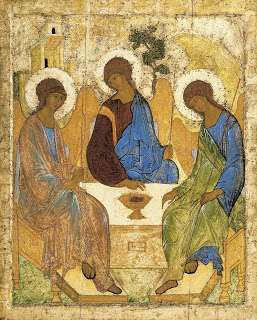 The Holy Trinity sends greetings
The Holy Trinity sends greetings
People often ask me, “Why start the Mass with a ritual greeting? This sounds so stiff-and-official-like. Why not just start with a warm and friendly greeting like ‘Good Morning’?” Good question. This would, indeed, be the right approach if the Mass were nothing more than a meal with family and friends, but, in reality, it is infinitely more than that. The Mass is not an informal gathering of a group of people. It is a sacred moment before God. This is why the Missal gives the formal, stylised greeting that the priest is expected to use. If we believe the Mass is a representation of the Holy Sacrifice of Jesus on the Cross, you wouldn’t appreciate being greeted with a happy chirpy “Good morning” as you contemplate our Lord’s suffering and death on Good Friday, would you? Since it is a sacred moment before God, then the formality and solemnity of the words should be befitting God, for the Eucharist is an anticipation of the heavenly wedding banquet which God Himself prepares for us. The Most Holy Trinity, the Father, the Son and the Holy Spirit, is now inviting us to enter into their inner circle, into their intimate communion which is the basis and foundation of all other communions.
As far as liturgical greetings are concerned, there are three options available. Each option highlights the special nature of our gathering for Mass. Today, I would like to consider the first option, the Trinitarian option. The priest utters these words immediately after the sign of the cross. “The grace of our Lord Jesus Christ, and the love of God and the communion of the Holy Spirit be with you all.” As warm and as friendly as a “good morning” greeting sounds to common folks, the liturgical greeting is far more superior. It all makes absolute theological sense. We come for Mass not because of the priest (although truth be told, many people choose their priests. Fr Friendly Smile is always preferred over Fr Prune face). We come for Mass not just to see each other. We come for Mass because of God. And it is only proper that the priest, the minister of God, should greet us in the name of God, the Most Holy Trinity.
These words are the last words of Saint Paul’s second letter to the Church of Corinth, which we heard in the second reading. Since Saint Paul refers to God the Father simply as “God”, this blessing is clearly Trinitarian. It expresses the Church’s belief in one God who is Father, Son and Holy Spirit. It briefly sums up the very essence of the Christian life. This is a good reminder that the Trinity is not primarily the subject of intellectual discourse. No, the Most Holy Trinity is first and foremost, the object of our worship, of our liturgy. To grasp the Mystery of the Most Holy Trinity, we must do so on our knees, in humble adoration and worship.
In this greeting, Saint Paul does not follow the order in which we normally name the divine persons of the Trinity. Rather, he first mentions Jesus, who is the Son before he names God the Father. This very unusual word order, unlocks for us the theology of Saint Paul about how we are saved. Paul begins the greeting by saying “the grace of the Lord Jesus Christ”. He uses the word “grace” to express the salvation event. Through the death and resurrection of Jesus, our sins are forgiven and we are reconciled with God. Thus, it is through the grace of the Lord Jesus Christ that we come to the Father. As Jesus Himself said, “No one comes to the Father except through me” (Jn 14:6).
Paul ends the greeting with the words “the communion of the Holy Spirit”. In the translation of the third edition of the English translation of the Roman Missal, “communion” replaces the word “fellowship”. Both words translate from the Greek word “koinonia.” It’s good to unpack this word because the word “fellowship” and the word “communion” have taken on very different meanings from the original “koinonia.”
First of all, the expression “the communion of the Holy Spirit” reminds us of the intimate relationship that every believer has with the Holy Spirit. The Risen Lord pours out His Holy Spirit on each of us. It is because of the Holy Spirit dwelling within us, that we can call Jesus “Lord” (I Cor 12:4); and, it is in the power of the Holy Spirit that we call God “Father” (Gal 4:6).
Second, the expression “the communion of the Holy Spirit” also reminds us that the Holy Spirit gives to each of us different gifts for a purpose. Using these different gifts, we are to work together for the good of the whole Church and thus form one body, one communion of faith (I Cor 12:7; Gal 5:22).
Something else needs to be said about the syntax of this greeting. In the original Greek found in Saint Paul’s letter, the word “be” is missing, so it can be understood both as a statement of fact and as a wish. But now with our liturgy adding the verb “be” in the greeting, the Church is confident in declaring her faith in the Trinity – it is not just a wish but a statement of fact, a statement of faith. She is confident of the love of the Father who has called together His children into His Church and who has sent His Son so that by His sacrifice we may be gathered into a communion whose inspirer and unifier is the Holy Spirit. This is what happens at every Mass. In the liturgy, all three persons of the Trinity are taking us up into their life as the one God, and forming us here on earth as the Body of Christ.
So, the next time you are tempted to walk up to the priest and ask him to change the wording of the Mass, so that it would sound less off-putting, less formal, more familiar, remember this simple truth – the Mass is not about you, it’s not even about the priest, it is first and foremost about God, the Most Holy Trinity, whom we worship, and the very same Holy Trinity who now invites us, unworthy though we are, into the community of Persons, where each is distinct and yet perfectly united. “Unity in diversity” is not just a pretty slogan. It is already a reality in the three persons whom we call God. The deeper we grow in union with God, the deeper and more authentic would our communion be.

